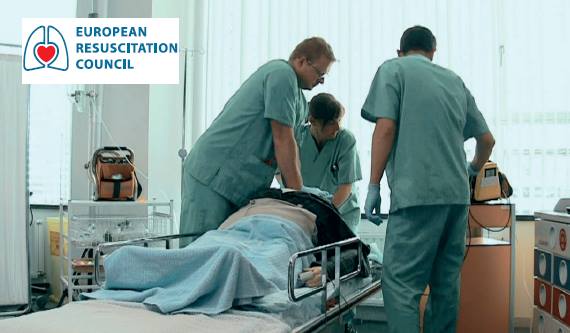The European Resuscitation Council (ERC) has developed its Advanced Life Support (ALS) provider course, based on ERC guidelines. It is a standardised European course teaching evidence-based resuscitation guidelines and skills to healthcare professionals. The ALS course provides a standardised approach to cardiopulmonary resuscitation in adults. The ALS course aims to train candidates to identify the causes of cardiac arrest, recognise patients in danger of deterioration, and manage both the cardiac arrest and the ‘peri-arrest’ problems encountered in the first hour or so after initial resuscitation from a cardiac arrest.
Course structure and programme
ALS courses are held at centres throughout Europe, Africa, the Middle East and Far East. They are approved and certified by the European Resuscitation Council. This ensures uniformity of content and standard regardless of the centre.
The course comprises:
- Workshops
- Skill stations
- Lectures
- Cardiac arrest simulation (CAS) training
Candidates’ knowledge is assessed by means of a multiple-choice question paper. Practical skills in airway management and the initial approach to a collapsed patient (including basic life support and defibrillation where appropriate) are assessed continuously. There is also an assessment of a simulated cardiac arrest (CASTest). Candidates reaching the required standard receive an ALS provider certificate.
The multidisciplinary nature of the course encourages efficient teamwork. By training together, all ALS providers are given the opportunity to gain experience as both resuscitation team members and team leaders.
Medical students, nurses and other healthcare providers for whom this course may exceed their training needs should be encouraged to complete the Immediate Life Support (ILS) course. Those with a particular interest in resuscitation should then consider attending an ALS provider course, where appropriate. Medical students in their final year of training can be accepted as candidates on an ALS course if this is an established local arrangement.
Learned skills
- Recognise and treat a deteriorating patient using a structured ABCDE approach
- Deliver standardised CPR in adults
- Manage a cardiac arrest by working with a multidisciplinary team in an emergency situation
- Use non-technical skills to facilitate strong team leadership and effective team membership
Characteristics
- Target audience: All healthcare professionals who are expected to provide resuscitation in a team
- Theory: Online course on CoSy
- Hands-on part: 2 days (minimum 14hrs excluding breaks)
- Validity certificate: 3 years (but NRCs are free to set validity from 1 to 5 years)
